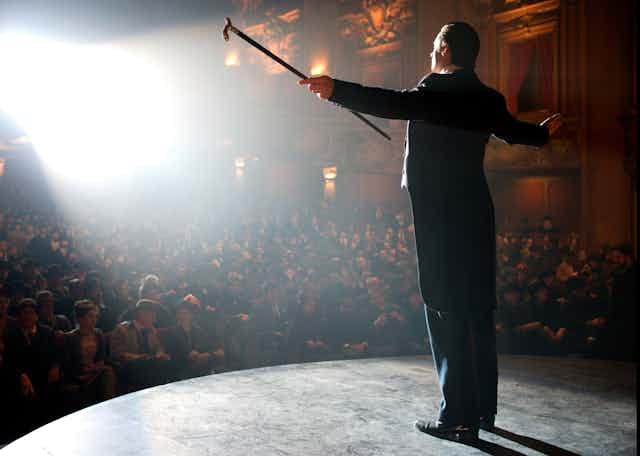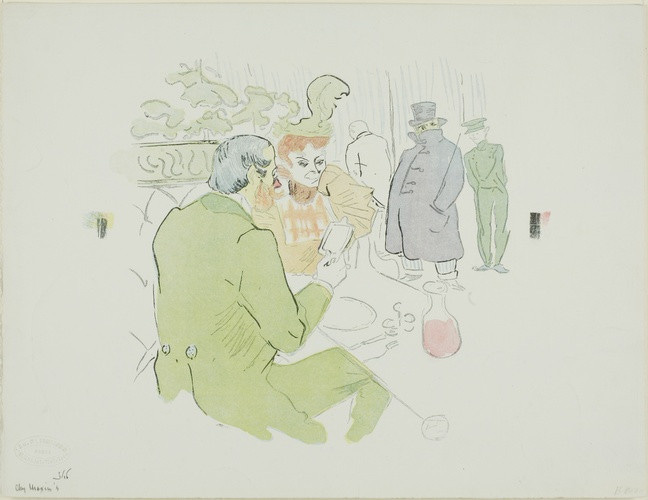It is a truth rarely acknowledged that prestige is the driving force in American cultural society. This is something that I and every one of my peers knows, but rarely talk about. The idea of it comes up in conversation, it’s presence is acknowledged with chagrined looks and nods, and that’s it. Once in a while, the smoke rises out of me and I start to put it in plain words, but invariably get the kind of reaction that reads as “time to change the subject.”
Prestige is a bad thing—and it is bad—that is so constant and pervasive that it’s part of the noise we have to endure to get at the signal. It’s a rot pitched at the 60Hz background hum of civilization, the signal just manages to carry over it. Usually. But the last few weeks have been packed with noise pitched at a higher frequency and amplitude, a few times directed at me personally. In hopes of hearing the signal better, for myself and all of us, I want to illuminate that noise.
Bringing the Noise
Kalefa Sanneh wonders in The New Yorker “How Music Criticism Lost Its Edge.” Yeah, we’re all trying to find the guy who did this. Sanneh’s argument in his seminal 2004 article presented itself as progressive, breaking free of what certainly was and can be the reactionary confines of rock criticism. But to promote what is essentially popularity as an aesthetic/creative virtue is an obvious problem. Popularity in a consumer-capitalist society is easily manipulated by the power of money, and popularity produces prestige, and prestige is the currency of the culture.
What is prestige? A close synonym is celebrity, being famous for being famous. But celebrity is just being known while prestige adds being praised. Prestigious things and prestigious people are praised simply because they’re prestigious, no matter their quality or their content. This might seem innocuous, just people enjoying the MCU and Dan Brown books, let them have their pleasures. But the combination of the lack of anything, pervasiveness, and prestige is toxic to society.
Prestige makes people lazy, so they cast failed businessman Donald Trump (“when you’re a star, they let you do it”) in The Apprentice and boosted his prestige so that now he’s building a giant ballroom next to the White House because it’s prestigious and he thinks it’s a Presidential Palace he’ll never leave. Prestige media stands in awe and some affection for him, because he represents their values: being important and never being questioned. Prestige is a class that has the consciousness to preserve and protect itself, and does so through constant mutual promotion. Politically it is autocratic, socially atavistic, and aesthetically it’s decadent. All this collapses together in the Memo of Understanding that Peter Gelb signed with Saudi Arabia.
I have been writing about opera for almost two decades, and came to it with practice in it as a composer, and the form, the scores are marvelous. Living at the edge of poverty and sitting in the expensive seats taking notes, surrounded by extremely wealthy people, I’m acutely aware of how opera has a social culture that values prestige. And now Peter Gelb, who knows little about opera and has no particular taste, has de jure established the Metropolitan Opera as a social bauble of a theocratic kingdom that stones women to death for adultery, uses slave labor, and is run by a man who ordered the murder and dismemberment of a journalist (here’s a good post on the awful details).
Ah, but what’s more prestigious than royalty, amirite? And I can’t imagine anyone but royalty will be allowed in to see performances. Just, be careful what you put on stage; no Le Nozze di Figaro or Mozart in general, absolutely not Fidelio, probably nothing from the 20th century. It’s all going to be so great.
Class, Not Classy
Prestige is bad for art, and it has pained me recently to be confronted by how 1% prestige will always triumph over 99% quality and accomplishment, and the fight isn’t even that fair. Prestige swamps attention, even from too many critics, and even from too many insiders. In my own experience, I started writing regularly about classical music performances close to 20 years ago, but when I started getting bylines at the Financial Times—with the same critical ideas and coverage—I started to get a lot more attention from the promotional side. My content was the same, but my placement was more prestigious.
However, one thing that may be surprising to many is that going back all the way to when I was a nobody blogger, classical music institutions were open and eager to have me cover their events. I will always credit the Met Opera—yes!—the New York Philharmonic, and the like, for always welcoming me as a critic. They wanted to be seen by everyone, and for the most part that value remains. Even when I had no prestige.
Not that I have any now. I was recently confronted with how in the jazz/hip festival world my actual accomplishments as a critic, which I think are considerable, aren’t valued because they’re not attached to a prestigious byline. And another thing that may be surprising to many is that the jazz world of writers, venues, and many labels is still cliquish in the reactionary way Sanneh found, understandably, objectionable in rock and pop writing.
Sanneh’s view of contemporary music criticism ultimately fails because it’s uninformed. He looks at places like Pitchfork, owned like The New Yorker by Condé Nast, meaning he only sees writing that’s at publications commensurably prestigious as his magazine. They all for the most part only see prestige. It’s an intellectual ecosystem that is enclosed, narrow and shallow. The human endeavor of music doesn’t matter, the prestige does. The boring predictability of Taylor Swift is its paragon because a boring, predictable culture is the style of prestige. It’s a waste, and a loss, and decadent.
Here, I will repeat something I’ll probably still be muttering in my grave: in a changing society, staying where you are is reactionary. Perhaps not literally so in terms of politics, but absolutely so socially and aesthetically. And prestige stays where it is, preserving its status is the prime directive. The way prestigious cultural institutions reach with mild interest but smug self confidence toward the tail end of trends confirms this; it’s a paternalistic condescension toward some triviality that couldn’t possibly affect the course of the ship of state that is prestige, it’s Tony and A.J. cruising out on The Stugots, eyes fixed dreamily on the horizon, oblivious to the smaller craft swamped along the way.
This is What You Want, This is What You Get
I’ve got an example of what Sanneh claims to want, right here. There’s some problems with it though: 1) I don’t have any prestige, so he will never read this, and; 2) “passionate hyperbole,” “exasperation,” “denunciations,” and “mean,” things Sanneh wishes for, are not things I believe a prestige publication values at all. Too disruptive to the paradigm. Even so, let’s get to Brad Mehldau’s latest release:
When I was a kid, my dad would take me to get my hair cut at what we would now call a business-man or old-man barbershop. The barbers wore blue short-sleeve smocks with the names stitched over the breast pocket, there was that cool, comforting aroma of Barbicide, the radio played easy listening background music, instrumental versions of Sinatra ballads that were heavy on the strings, “Manhã de Carnaval” carried on trombone, stuff like that. This Mehldau album takes songs by Elliot Smith and turns them into instrumental jazz-combo/orchestra versions (with some vocals), and while I’m tempted to compare it to the barbershop music, that’s not quite true, because it has about 50% less substance than that. It is, I guess, some kind of feat to do this with Elliot Smith.
A couple decades ago, Mehldau was on the verge of being one of the great jazz pianists. Then he met Jon Brion, made Largo, and something started to happen to his mind. The last few albums have included the execrable Jacob’s Ladder, the glib and vapid Your Mother Should Know, some mediocre classical interpretations, and now this. He just doesn’t seem to care anymore. But then again, he doesn’t need to, he’s got prestige.




The thing that's funny to me is that prestige has nothing to do with actual numbers. I've been writing a monthly jazz column for Stereogum since 2017. It gets more readers than DownBeat, and most of those readers know very little about jazz. But I still have to pester jazz publicists to even notice what I'm doing, never mind quote my reviews of the albums they're pushing. The BA newsletter, despite reaching almost 5000 people a week, has even less cachet within the jazz industry. If I was a bitter, cranky asshole, I might complain about this more. Instead, I write for whoever's reading.
Great essay, George. But I'm going to speak up in defense of prestige, corrupting and corrosive as it may be. Prestige is the main – and possibly only – reason that forms of artistic expression that are marginalized in the marketplace are able to get support from governmental, corporate, and philanthropic funding sources. The reflected glow of The Canon makes it attractive for these entities to support NYCB, the Philharmonic, Met Opera, etc. They all have their hidebound aspect, but I'd hate to imagine our city's cultural landscape without them. Most importantly, with that framework in place – i.e., classical music = prestige – more progressive artists, ensembles, and organizations are able to secure funding when they would perish in a market-driven context. (cf Will Robin's "Industry")